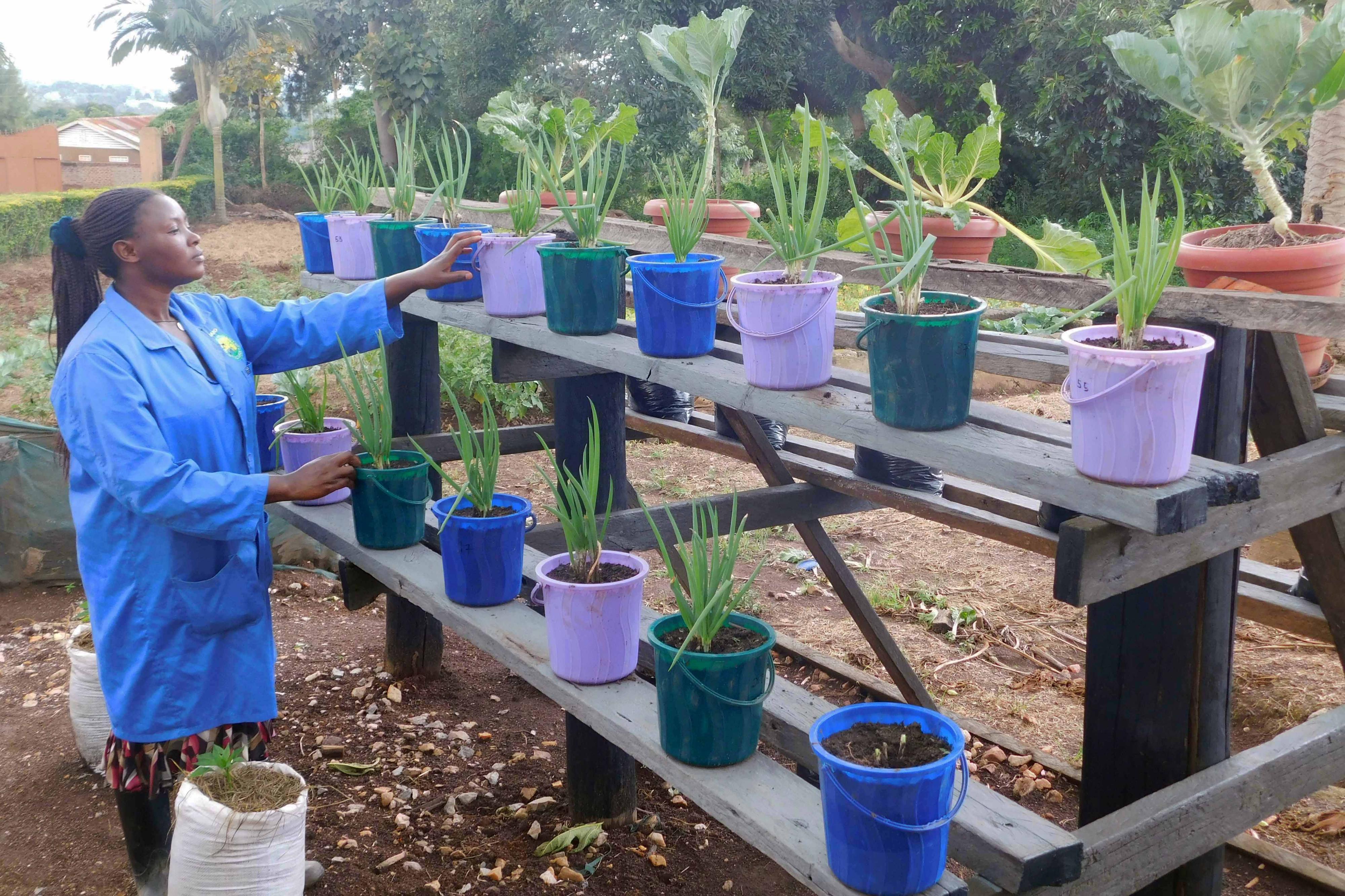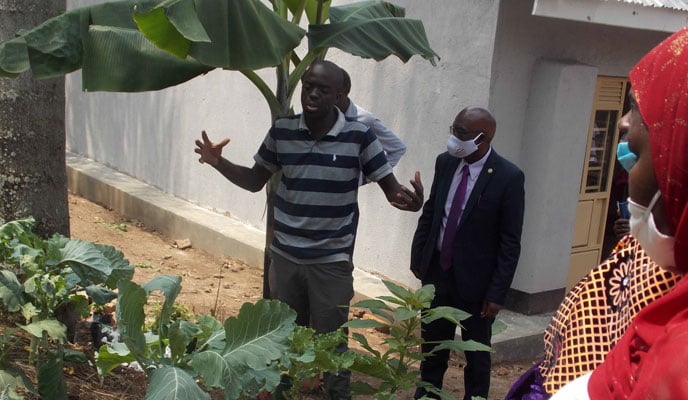Prime
Urban farming and vegetable production

Constance Ithungu demonstrates that vegetables can be grown in a bucket of soil. Photo/Michael J Ssali
What you need to know:
- It is better to plant vegetables at the beginning of the rainy season.
- However, for people living in towns where there are public water supply systems a vegetable farmer may plant any time of the year since he can carry out irrigation.
Many town dwellers spend a lot of money buying vegetables as part of their diet. Some people refer to vegetables as medicinal foods because of their nutritive nature and contribution to good health.
They are rich in vitamins and they are said to ease digestion and to prevent a lot of health disorders.
Health workers strongly advise pregnant women to include vegetables in their diet because they are a good source of minerals such as calcium and iron.
Easy to grow
Constance Ithungu, Crops Technician in charge of Urban Farming and Vegetable Production at Mukono Zonal Agricultural Research Development Institute (MUZARDI) Kamenyamiggo Satellite says that most town dwellers don’t have to worry about buying vegetables all the time especially if they are in the low income category.
“It is possible for town dwellers to grow their own vegetables and save the money that they would be spending on them,” she says.
“Even those who live in single rooms in towns can grow their own vegetables on soil packed in bags and placed right on their verandas. They may even open up small gardens in the backyard. That is mainly the training that we give most attention to ---- helping urban communities to improve their diet and also to generate income by growing vegetables.”
Quick money
She also believes that vegetable farming is a quick way to get money especially for the youths that are struggling to become self-employed.
“On a fairly small piece of land,” she says, “one may plant perhaps 1,500 plants of sukumawiki which can be harvested every week and become a regular source of income for some six months.” Some people make ornamental small gardens of vegetables of different colours in their compounds.
Agronomy
To grow vegetables successfully, Ithungu says, good ground preparation is important. The soil should be fine and free of clogs. If the soil is not naturally fertile it is good to mix it with composite manure or livestock droppings.
If organic manure is difficult to get Constance advises the use of DAP, obtainable from farmers’ shops, which can be applied in small amounts in every hole where vegetable seeds or seedlings are to be planted.
Planting
She further says it is better to plant vegetables at the beginning of the rainy season. However, for people living in towns where there are public water supply systems a vegetable farmer may plant any time of the year since he can carry out irrigation.
The soil should be fine because most vegetables are not deep rooted. The seeds are placed thinly in rows at distances recommended by agriculturalists and normally indicated by seed companies on the seed packages.
Ithungu advises farmers to purchase vegetable seeds from well recognised farmers’ shops and to strictly follow the user instructions. This is useful because the recommended spacing will be carried out and, most probably, it will lead to good yields.
For some vegetables such as tomatoes, the seedlings are prepared in nurseries and then transplanted into holes in the field.
In some cases, especially where seeds were directly planted in the garden, as the plants grow it may be necessary to thin them to reasonable spaces in the row to avoid overcrowding. This is also carried out during weeding for crops like beans, groundnuts, and peas.
Crop rotation
She said crop rotation should be practiced to discourage multiplication of pests. “If cabbages have been growing in some space in the garden it is advisable to plant another vegetable crop after the cabbages have been harvested. Most vegetables are short term crops and are normally fully harvested and finished after six months.
It is good to burn and destroy any residues. Alternatively any left-over material may be fed on livestock if the farmer keeps animals like pigs, goats or cattle.
In the space where cabbages have been growing the farmer may plant another vegetable crop like carrots.
The pests that have been used to eating cabbages will have little chance to survive when the cabbages have been replaced with carrots.”
In their book titled: “Establishing and Managing Conservation Agriculture”, Drake Mubiru, Jalia Namakula, Geofrey Otim, Joselyn Kashagama and Milly Nakafeero state, “In conventional farming the same crop is sometimes planted every season on the same piece of land. This allows certain pests, diseases, and weeds to survive and multiply, and lowers soil fertility, resulting in lower crop productivity. In Conservation Agriculture this is minimized by planting the right mix of crops from season to season. Rotation with legumes helps to improve and maintain soil fertility.”
Common vegetables
The commonest vegetables grown in Uganda include cabbages, nakati, sukuma wiki, cauliflower, pepper, tomatoes, onions, carrots, cucumber, green pepper, lettuce, and many others. For vegetable farmers living in urban centres vegetable growing is bound to be quite paying since towns and cities are the biggest market for vegetables.
Majority of urban dwellers are not farmers and they have the cash to pay for food items like vegetables.
The urban vegetable farmer does not worry about transport delays and storage of his product, because he has the option of harvesting only the amount that he can sell for the day and at a given time.
Ithungu says that even vegetable farmers have pests and crop disease issues.
“It is difficult to grow some vegetables such as tomatoes without spraying them with pesticides,” she says.
“However some crops are more susceptible to pests than others. Cabbage tends to require less frequent spraying than tomatoes.” She strongly advises farmers to strictly follow manufacturers’ guidelines when applying the pesticides.
It is important for the farmer to understand that pesticides are poisons and that if carelessly handled can cause health issues to both the farmer and the food consumers.
Farmers must be meticulous with regard to hygiene since they are food handlers.
They must not place vegetables on unclean surfaces and they should transport them in boxes or crates so that they are protected from damage and contamination.
Many vegetables are eaten in raw form and consumers are advised to wash them thoroughly with clean water before eating them.




